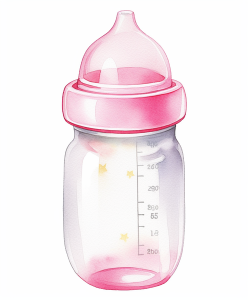Introduction
Understanding the different types of baby formula can be a daunting task for new parents. With so many options available, it can be difficult to determine which type of formula is best for your baby. This article will provide an overview of the different types of baby formula, including cow’s milk-based, soy-based and specialty formulas.
We will also discuss the benefits and drawbacks of each type, so you can make an informed decision about which formula is right for your baby. With the right information, you can ensure that your baby gets the nutrition they need to grow and thrive.
Exploring the Different Types of Baby Formula
Baby formula is a popular choice for parents who are unable to breastfeed their infants. It is a convenient and nutritionally complete alternative to breast milk and it comes in a variety of types to meet the needs of different babies. Here, we explore the different types of baby formula and their key characteristics.
Cow’s Baby Formula
The first type of baby formula is cow’s milk-based formula. one of the most common types of baby formula and is usually the first choice for parents. It is made from cow’s milk that has been modified to make it more like breast milk. It is a good source of protein, carbohydrates, fats and it is fortified with essential vitamins and minerals. It is also relatively easy to digest.
Soy Baby Formula
The second type of baby formula is soy-based formula. This type of formula is made from soybeans and is suitable for babies who are lactose intolerant or have an allergy to cow’s milk. It is a good source of protein and is fortified with essential vitamins and minerals. It is also relatively easy to digest.
Hydrolyzed Formula
The third type of baby formula is hydrolyzed formula. This type of formula is made from cow’s milk that has been broken down into smaller pieces, making it easier to digest. It is a good choice for babies who have difficulty digesting cow’s milk-based formula.
Hypoallergenic Formula
The fourth type of baby formula is hypoallergenic formula. This type of formula is made from a combination of proteins that are broken down into smaller pieces, making it less likely to cause an allergic reaction. It is a good choice for babies who have a history of allergies or sensitivities.
Specialty Formula
Finally, the fifth type of baby formula is specialty formula. This type of formula is designed for babies with special needs, such as premature babies or those with certain medical conditions. It is usually tailored to meet the specific needs of the baby and is usually more expensive than other types of formula.
Specialty formula refers to infant formula that is specifically designed to meet the unique nutritional needs of infants with specific conditions or dietary restrictions. These formulas are carefully formulated to provide the necessary nutrients for infants who may have difficulty digesting certain proteins, have allergies or intolerances or require specialized nutrition due to medical conditions.
Types of Baby Formula and Examples of specialty formulas include:
Hypoallergenic Formula:
These formulas are designed for infants with cow’s milk protein allergies or sensitivities. They contain extensively hydrolyzed proteins or amino acids that are easier to digest and less likely to trigger an allergic reaction.
Soy-Based Formula:
Soy-based formulas are made with soy protein and are suitable for infants with lactose intolerance or those who cannot tolerate cow’s milk-based formulas. However, it’s important to note that soy-based formulas should be used under the guidance of a healthcare professional.
Preemie Formula:
Preemie formulas are specifically designed to meet the nutritional needs of premature infants who may require additional calories, protein, and nutrients to support their growth and development.
Lactose-Free Formula:
Lactose-free formulas are suitable for infants with lactose intolerance, a condition in which the body has difficulty digesting lactose, the sugar found in milk.
Anti-Reflux Formula:
Anti-reflux formulas are thicker in consistency and are designed to reduce symptoms of reflux in infants, such as spit-up or regurgitation.
Amino Acid-Based Formula:
Amino acid-based formula is made from individual amino acids, which are the building blocks of proteins. It is a good choice for babies who cannot tolerate cow’s milk-based formula or soy-based formula. It is also a good choice for babies with severe allergies or digestive issues.
It’s important to consult with a healthcare professional, such as a pediatrician or a registered dietitian, before introducing any specialty formula to your baby. They can provide guidance on the most appropriate formula for your baby’s specific needs and help monitor their growth and development.
When choosing a baby formula; consider the needs of your baby and your budget. Different types of formula have different benefits and drawbacks, so it is important to do your research and talk to your doctor before making a decision.
Types of Baby Formula and Benefits
When it comes to feeding your baby, you have many options. Each type of baby formula has its own unique benefits, so it’s important to understand the differences between them. Here is a breakdown of the benefits of each type of baby formula:
Benefits of Cow’s Milk-Based Formula:
Cow’s milk-based formula is one of the most common types of baby formula used for babies. It is made from cow’s milk that has been modified to make it easier for babies to digest. It contains all the essential nutrients that babies need for healthy growth and development. It is also the least expensive type of formula.
Benefits of Soy-Based Formula:
Soy-based formula is made from soybeans and is a good option for babies who are lactose intolerant or have a milk allergy. It is also a good choice for vegan families. Soy-based formula is fortified with essential vitamins and minerals, and it is easy to digest.
Benefits of Hydrolyzed Protein Formula:
Hydrolyzed protein formula is made from cow’s milk that has been broken down into smaller pieces. This makes it easier for babies to digest. It is a good choice for babies who have difficulty digesting cow’s milk-based formula.
Benefits of Amino Acid-Based Formula:
Amino acid-based formula is made from individual amino acids, which are the building blocks of proteins. It is a good choice for babies who cannot tolerate cow’s milk-based formula or soy-based formula. It is also a good choice for babies with severe allergies or digestive issues.
Benefits of Specialty Formulas:
Specialty formulas are designed for babies with specific health needs. These formulas are tailored to meet the individual needs of the baby and may include added vitamins, minerals and other nutrients.
Different types of baby formula you can choose from, it is important to talk to your pediatrician to make sure it is the right choice for your baby. Each type of formula has its own unique benefits, so it is important to understand the differences between them.
Comparing the Nutritional Value of Different types of Baby Formulas
When it comes to feeding a baby, parents have a lot of decisions to make. One of the most important decisions is which type of baby formula to use. Different types of baby formulas provide different levels of nutrition, so it’s important to compare the nutritional value of different baby formulas before making a decision.
One of the most common types of baby formula is cow’s milk-based formula. This type of formula is made from cow’s milk that has been modified to be more easily digested by a baby’s immature digestive system. Cow’s milk-based formulas are typically fortified with iron, calcium and other vitamins and minerals to ensure that babies get the nutrients they need.
Soy-based formulas are another popular option. These types of baby formulas are made from soy protein isolate and are often recommended for babies who are sensitive to cow’s milk proteins. Soy-based formulas are also fortified with iron, calcium and other vitamins and minerals to provide complete nutrition.
Hypoallergenic formulas are specifically designed for babies who are sensitive to cow’s milk proteins and soy proteins. These types of baby formulas are made from partially hydrolyzed proteins, which are easier to digest than cow’s milk and soy proteins. Hypoallergenic formulas are also fortified with iron, calcium and other vitamins and minerals to provide complete nutrition.
Organic formulas are made from organic cow’s milk, soy or other ingredients. These types of baby formulas are not necessarily more nutritious than non-organic formulas, but they are made without the use of pesticides, hormones or antibiotics.
Finally, there are specialty formulas, such as lactose-free formulas, which are designed for babies who are lactose intolerant. These types of baby formulas are made from cow’s milk that has been modified to be easier to digest.
When comparing the nutritional value of different types of baby formulas, it’s important to look at the ingredient list and the nutrition facts panel. All formulas should provide complete nutrition, but some may contain additional ingredients that may be beneficial for a baby’s health. It’s also important to talk to a doctor or nutritionist to determine which types of baby formula is best for a baby’s individual needs.
Identifying the Right Baby Formula for Your Baby
When it comes to feeding your baby, choosing the right formula is an important decision. It is important to select a formula that is tailored to your baby’s needs and will provide the essential nutrients they need to grow and develop.
The first step in choosing the right formula is to understand the different types of baby formula available. There are two main types of formula: cow’s milk-based and soy-based. Cow’s milk-based formulas are the most common and are made from cow’s milk that has been altered to make it easier for babies to digest. Soy-based formulas are made from soy protein and are a good option for babies who are sensitive to cow’s milk or who have a lactose intolerance.
It is also important to consider your baby’s age when selecting a formula. Infant formulas are designed for babies from birth to 12 months and contain all the essential nutrients needed for growth and development. Toddler formulas are designed for babies from 12 months to 24 months and are higher in calories and fat to meet the increased energy needs of toddlers.
When browsing best suitable types of baby formula, it is important to read the label and check the ingredients. Look for formulas that are fortified with iron, calcium, and other vitamins and minerals. Also, check to make sure the formula is free of artificial colors, flavors and sweeteners.
It is also important to consider your baby’s dietary needs when selecting a formula. If your baby has any food allergies or sensitivities, you may need to select a hypoallergenic formula. If your baby has a special medical condition, you may need to select a specialized formula.
Finally and before all steps above, it is important to talk to your baby’s doctor before selecting a formula. Your doctor can help you select the right types of baby formula for your baby and provide advice on how to prepare and store the formula safely.
Choosing the right types of baby formula for your baby can be a daunting task. However, by understanding the different types of formula available and considering your baby’s age, dietary needs and medical condition, you can select a formula that is tailored to your baby’s needs and will provide the essential nutrients they need to grow and develop.
Understanding the Pros and Cons of Different Baby Formulas
When it comes to feeding your baby, there are many options available, including breast milk, formula and a combination of both. Each option has its own set of pros and cons and it’s important to understand them in order to make the best decision for your baby.
Breast milk is the ideal food for babies, as it contains all the essential nutrients and antibodies that a baby needs to grow and develop. It also helps to promote bonding between mother and baby. However, some mothers may not be able to produce enough milk, or may not be able to breastfeed for other reasons. In these cases, formula can be a great alternative.
Formula is a manufactured food designed to provide all the essential nutrients and antibodies that a baby needs. It is available in a variety of forms, including cow’s milk-based, soy-based and hypoallergenic formulas. Each type of formula has its own set of pros and cons, so it’s important to understand them before making a decision.
Cow’s milk-based formula is one of the most common types of baby formula and is usually the least expensive. It is made from cow’s milk that has been modified to make it more digestible for babies. The main advantage of cow’s milk-based formula is that it is the closest to breast milk in terms of nutrition. However, it can be difficult for some babies to digest and it may cause allergies in some babies.
Soy-based formula is made from soybeans and is designed for babies who are unable to digest cow’s milk-based formula. It is also suitable for vegan families. The main advantage of soy-based formula is that it is easier to digest than cow’s milk-based formula. However, it may not provide all the essential nutrients that a baby needs, and it may also cause allergies in some babies.
Hypoallergenic formula is designed for babies who have a higher risk of developing allergies. It is made from proteins that have been broken down into smaller pieces, making them easier to digest. The main advantage of hypoallergenic formula is that it is less likely to cause allergies than other types of formula. However, it may be more expensive than other types of formula and it may not provide all the essential nutrients that a baby needs.
When choosing a baby formula, it’s important to consider the pros and cons of each type in order to make the best decision for your baby. Talk to your doctor or pediatrician if you have any questions or concerns about which types of baby formula is best for your baby.






